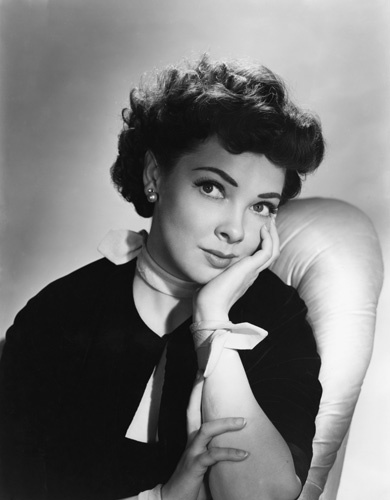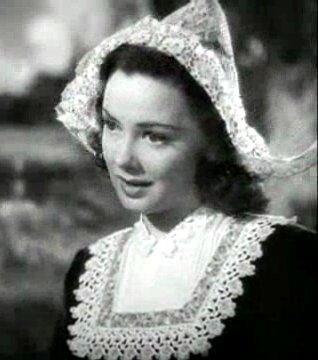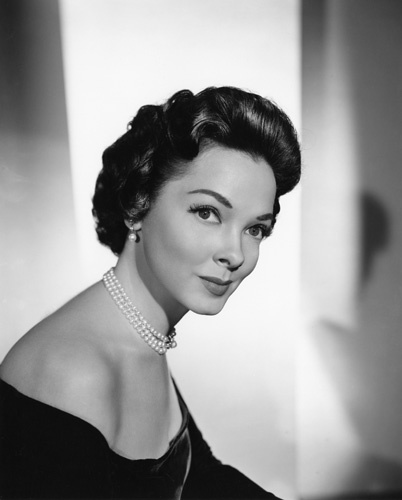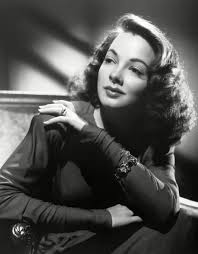

Kathryn Grayson (born Zelma Kathryn Elisabeth Hedrick; February 9, 1922 - February 17, 2010) was an American actress and coloratura soprano. From the age of 12, Grayson trained as an opera singer. She was under contract to Metro-Goldwyn-Mayer by the early 1940s, soon establishing a career principally through her work in musicals. After several supporting roles, she was a lead performer in such films as Thousands Cheer (1943), Anchors Aweigh (1945) with Frank Sinatra and Gene Kelly and Show Boat (1951) and Kiss Me Kate (1953), both with Howard Keel. She also worked in theatre, appearing in Camelot (1962-1964). Later in the decade, she performed in several operas, including La boheme, Madama Butterfly, Orpheus in the Underworld and La traviata.

Zelma Kathryn Elisabeth Hedrick was born on February 9, 1922, in Winston-Salem, North Carolina, one of four children of Charles Hedrick, a building contractor-realtor, and Lillian Hedrick (nee Grayson).The Hedrick family later moved to Kirkwood, Missouri, outside St. Louis. At the age of 12, Grayson was discovered singing on the empty stage of the St. Louis Municipal Opera House by a janitor, who introduced her to Frances Marshall of the Chicago Civic Opera, from whom Grayson received voice lessons. Grayson's sister Frances Raeburn (born Mildred Hedrick) was also an actress and singer, appearing along with her in the film Seven Sweethearts. Grayson had two brothers, Clarence "Bud" E. Hedrick, and Harold. The family moved to California when she was 15 years old.
In 1940, an MGM talent scout saw Grayson performing at a music festival. MGM hoped to find a replacement for Deanna Durbin, who had left the studio for Universal Pictures. For the next 18 months, Grayson took voice, drama and diction lessons and followed a routine of dieting and exercise. Within a year, she had her first screen test. However, studio executives were not satisfied, and she endured a further six months of lessons until she made her first film appearance in 1941's Andy Hardy's Private Secretary as secretary Kathryn Land, participating in three musical numbers.
Two further films were planned for Grayson in 1941: White House Girl, which was later produced in 1948 with Durbin, and Very Warm for May, from the Jerome Kern and Oscar Hammerstein musical of the same name. The film eventually was produced in 1944 as Broadway Rhythm. Grayson appeared in three films in 1942: The Vanishing Virginian, Rio Rita and Seven Sweethearts. In the first, Grayson plays the teenage daughter, Rebecca, of the eccentric Yancey family from Lynchburg, Virginia. Set in 1913, the film was based on Rebecca Yancey Williams's own family.
Grayson co-starred in Rio Rita with Abbott and Costello. Grayson portrayed the title character, Rita Winslow. The film was originally meant to be an adaptation of the 1927 Broadway musical; however, only two songs were retained for the film, the title song, and "The Ranger Song", which was performed by Grayson.
Co-starring Van Heflin, Seven Sweethearts cast Grayson as the youngest of seven daughters from Holland, Michigan, who is hired by reporter-photographer Heflin to serve as a model and secretary while he covers the town's tulip festival, and with whom he falls in love.

In 1943, Grayson appeared in the film Thousands Cheer, (originally titled Private Miss Jones), along with Gene Kelly, Mickey Rooney, Eleanor Powell, June Allyson and others. The film was intended as a morale booster for American troops and their families. Grayson starred as the singing daughter of an Army commander.

It was announced in 1942 that Grayson would appear in An American Symphony with Judy Garland. Garland was replaced by June Allyson, and the film was retitled as "Two Sisters from Boston" and released in 1946.
Grayson did not appear in any films for nearly two years (from 1943 to 1945), but instead worked at entertaining troops during the war and performing on radio programs. Notably, it is reported that she would only perform under the condition that the audience was integrated, as troops were segregated at the time.
She returned to films in Anchors Aweigh, a musical romantic-comedy set in Los Angeles and co-starring Kelly and Frank Sinatra. Anchors Aweigh was the fifth-highest grossing film of 1945, earning over $4.779 million.
This was followed by Two Sisters from Boston and guest appearances in Ziegfeld Follies and Till the Clouds Roll By. Her performance in Till the Clouds Roll By included "Make Believe" in a capsule version of the musical Show Boat, which would be remade five years later, with Grayson in the starring role.
MGM re-paired Grayson and Sinatra for two movies in 1947 and 1948, It Happened in Brooklyn and The Kissing Bandit. Both films performed poorly at the box office, and audiences thought the plots absurd. After the setbacks of Brooklyn and Bandit, Grayson was partnered with tenor Mario Lanza in That Midnight Kiss in 1949.
In 1950, Grayson was once again partnered with Lanza, and portrayed an opera singer in The Toast of New Orleans, and performed the Academy-Award-nominated song "Be My Love". While shooting the Madama Butterfly scene in the film, Lanza kept attempting to french kiss Grayson, which Grayson claimed was made even worse by the fact that Lanza would constantly eat garlic before shooting. Grayson went to costume designer Helen Rose, who sewed pieces of brass into Grayson's gloves. Any time Lanza attempted to french kiss her after that, she hit him with the brass-filled glove. For the premiere of the film in New Orleans, she was a guest at an auction selling the film's costumes.
Grayson replaced June Allyson in the role of Ina Massine in 1951's Grounds for Marriage. She portrayed an opera singer with laryngitis, alongside Van Johnson who played her doctor and love interest. This was also her first non-singing role at MGM. Grayson's musical performances do appear in the film, but in the form of recordings. Grayson was next cast as Magnolia Hawks in the 1951 remake of the 1927 Hammerstein and Kern musical, Show Boat. Show Boat was the third-highest-grossing film of 1951, earning over $5.533 million.
Grayson married twice, first to actor John Shelton and then to the actor/singer Johnnie Johnston. She was a Republican. Grayson adhered to Roman Catholicism. Shelton and Grayson eloped to Las Vegas, where they were married on July 11, 1941. The two had courted for 18 months, after meeting while making screen tests. In July 1942, Shelton moved out of their Brentwood home and into his own apartment. This came after a month of reconciliation after a judge dismissed their divorce suit. Grayson charged Shelton with mental cruelty. They divorced on June 17, 1946.
Grayson wed singer/actor Johnnie Johnston on August 22, 1947, in Carmel, California. Grayson and Johnston separated on November 15, 1950. On October 3, 1951, Grayson was granted a divorce from Johnston on the grounds of mental cruelty. Johnston's This Time for Keeps co-star, Esther Williams, claimed in her 1999 autobiography that while making the film, Johnston would read Grayson's intimate letters aloud to the girls in his fan club, including the "all-too-graphic details concerning what she liked about his love-making."